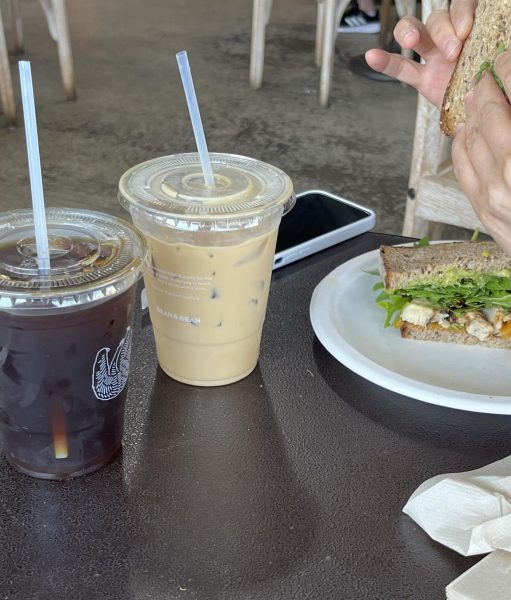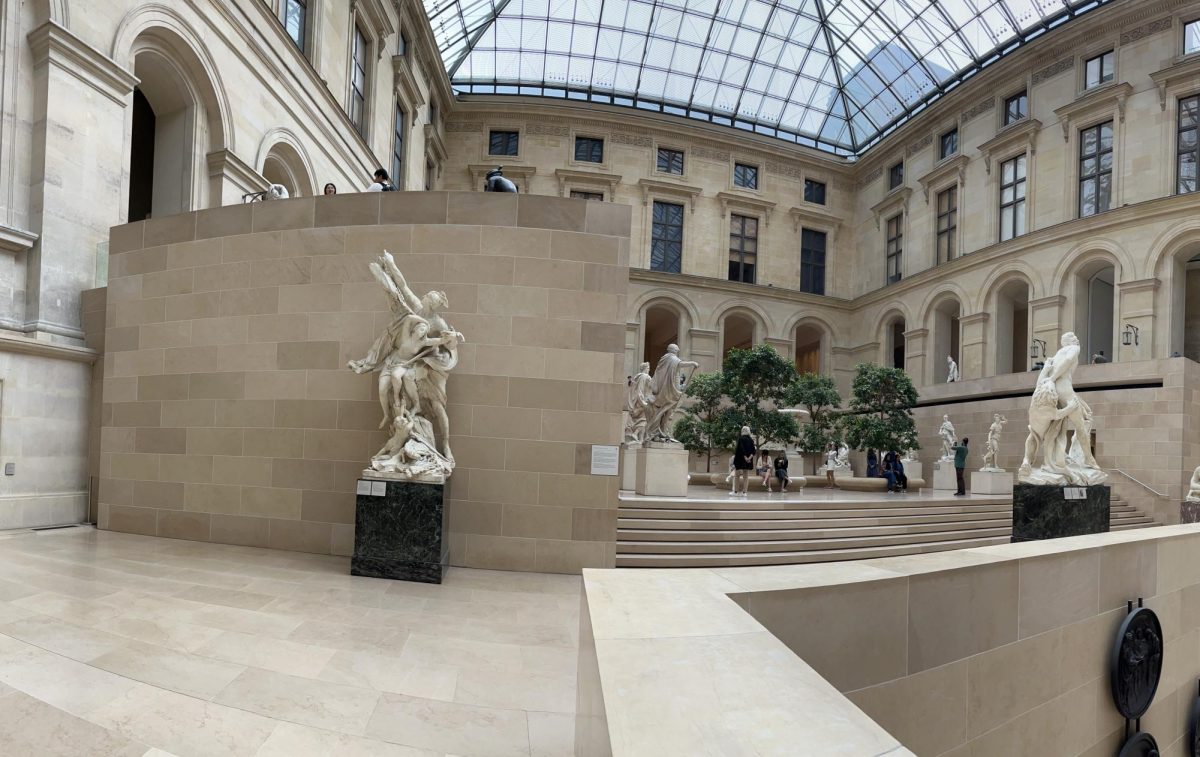“Stand clear of the closing doors, please,” an automated voice declares. The chilly air is contained within the thick walls of the metal subway car. The circular orange light of the subway car blinks on and off. The train begins to move, and you nearly topple over — just barely managing to grab onto the metal pole in the middle of the car. You settle down on the cold hard plastic seat and lean your head back. Soft rock music plays in the background as you look out the window. As the train leaves the station, the beautiful city landscape filled with stars in the sky comes into view.
The inconvenience of the MTA commute seems to disappear with this singular moment, doesn’t it? This is the phenomenon of the “romanticize your life” movement.
This movement is a common theme throughout nearly all forms of entertainment. Personal vlogs are often titled with the words, “aesthetic,” “productive,” or “pinterest inspired.” Most of these vlogs are filmed by female college students, showing their daily lives of studying or living with friends, among other activities. What links these videos together is that they are meant to be “Pinterest-inspired,” and they intricately weave together all sorts of the recent fads that make the videos appealing to many. One example of these fads is anime. Because of its colorful and mostly minimalist art style, anime is a common theme within “study vlogs” — despite anime itself generally having nothing to do with studying. Another form of entertainment that romanticizes life is chick flick movies from the 2000s that encouraged feminism and self identity. These movies often transformed normal girls into protagonists through their academic, social or athletic accomplishments. They sent a message to young teenage girls that their mundane lives can become a full, satisfying adventure, and that the choice to turn their lives around was within their own reach.
This movement rose in popularity during the Coronavirus pandemic, when life began to seem repetitive and mundane, and people struggled to push through their day. Students graduated remotely. Birthday candles were blown out alone. Friendships were tested from the strain of communicating solely through social media. But little bursts of happiness allowed for moments of silence in these great chaotic rites of passage.
Romanticizing your life creates these little bursts of happiness, making everyday life feel special no matter what is going on.
For example, when asked how they romanticized their life during the pandemic, Reddit user throwingitaway284629 responded, “I stopped saving nicer things for ‘special occasions’… This meant I never ended up using them and would just hold onto them yearning for the right ‘moment’ to wear them, which is never during a pandemic. On Valentine’s Day I dressed up as if I had a date… and went back home and felt so happy…” Despite indulging in such a small act, this Reddit user had felt so much happier after a single romantic moment with themselves.
Romanticizing your life promotes this kind of ideology where the person feels happiness from the smallest parts of their life.
That’s great, right?
No, not really.
Romanticism promotes “pretty privilege,” eurocentrism, and self-gaslighting.
As previously mentioned, the personal blogs that romanticize the blogger’s life are usually made by college students in their 20s. These women are often conventionally attractive. Many of the “aesthetic glow up” YouTube videos always start with their appearance. The saying is “Look good, feel good.” This can range from curling their hair, spraying on perfume, and doing their makeup.
Pretty privilege, as defined above, allows for the movement of being a “teenage girl” to go on.
It is only recent that the media has acknowledged its mistake of separating femininity from strength. “Being a teenage girl” allows the people affected by this mistake to “heal” in a sense. They get to embrace the ideas that they had restricted themselves from, for fear of appearing weak. It is meant to promote the healing of the damaged connection of girlhood within women that have been taught that being feminine goes against feminism.
This idea promotes young women feeling justified in their love for societally “girly” things, such as chick flicks, Taylor Swift, curling their hair, doing their makeup, getting ready with their friends, gossipping, and so on.

The problem with this is that it not only suggests that the outer appearance is what comes first, but it also somewhat limits the target audience. This is called “pretty privilege.” It places those that are considered to be conventionally attractive on a pedestal, causing cracks of insecurities within those that follow the romanticization movement.
“Romanticize your life” should be all about how the change in a mindset can change every aspect of your life. It is meant to promote feeling happy in your own skin, accepting your problems as they are, and making the best out of them.
So why should we have to look good to feel good?
Oftentimes, what I find on social media is young girls that struggle with the effects of eating disorders, depression, and other mental health issues because of societal pressures. “Romanticize your life” should provide a safe space for these young girls rather than exacerbate their struggles.
Furthermore, according to the YouTuber oliSUNvia, romanticizing your life promotes eurocentrism. The words “romantic,” “romance,” and “romanticism” are all so intertwined with European culture that it is nearly impossible to not think of European elements when envisioning your personal romanticized life. Imagine yourself reading a classic by the fireside with your favorite steamed drink in your hand. Most people will see themselves reading classic books such as Wuthering Heights, Pride and Prejudice, or other European novels from the Romantic era. In fact, the arts and humanities that are the most well known and sought after parts of the European “Romanticism” era. Very few people will conjure up the image of Sun Yat-sen’s Memoirs of a Chinese Revolutionary or The Arabian Nights [The Thousand and One Nights].
It may be difficult to recognize the negative aspects of this eurocentrism. As a whole, romanticism is meant to promote diversity in different lives. Everyone has a unique life. When you romanticize your life, perhaps the main question you should ask yourself is whether you’re celebrating that aspect of your life that makes you different from everyone else, or whether you’re crushing it down.
If a person strives to make their life as similar as possible to one singular example they had seen, we lose individuality as a whole. Does that mean we shouldn’t appreciate European cultures? Of course not. But before we hastily romanticize our lives, perhaps we should take into consideration whether our romanticization is based on our authentic beliefs and wants or rooted in the heavy European influence of our lives.
Another part of the problematic nature of romanticizing one’s life is the fact that people begin to ignore their incredibly raw and real problems.
Romanticizing your life preaches that happiness is a choice, and that you are the only person that can control your life. But that’s simply not true.
There are so many variables and situations that can affect your life. Romanticizing your life may help you leave the rut that you may be in, but it can also lead to promoting an unrealistic utopian life filled with only joy.
Not only does romanticizing your life promote ignoring your problems, it can lead to romanticizing your problems, as well.
For example, the pandemic also brought upon a new recognition of mental health issues. People began sharing their personal thoughts and experiences with mental health. With this came an increasing recognition of offensive vocabulary, social awareness, and sensitivity towards others. However, with this developing awareness also came an increase in the media’s usage of mental health as a form of entertainment. Although the media could have helped increase recognition, most of the time the media portrays mental health in a poor way.
Rather than focus on the struggles that people that grapple with mental health issues have, the media can also romanticize mental health issues. The media could show these struggles to highlight the message that those with mental health issues do not have a choice, and could help reduce stigma. And yet, the media produces content that makes a mockery out of mental health, and causes people to mistake their clinically considered “normal” actions for signs of mental disorder, creating even more misconceptions.
The most problematic nature of these forms of entertainment is that they twist mental health into something it is not in order to follow the original plot of the story. Because most of these entertainment sources will be expected to have a happy ending, screenwriters often romanticize the mental illness as a “blessing in disguise.”
So is romanticizing one’s life truly beneficial? Stephanie Lin ’25 summarizes it well. “It can be good and bad because I feel like if you over romanticize your life, you can’t face reality at that point. However, it can also be good because you can gain a more optimistic view of life.”
So is romanticizing one’s life truly beneficial? Stephanie Lin ’25 summarizes it well. “It can be good and bad because I feel like if you over romanticize your life, you can’t face reality at that point. However, it can also be good because you can gain a more optimistic view of life.”

